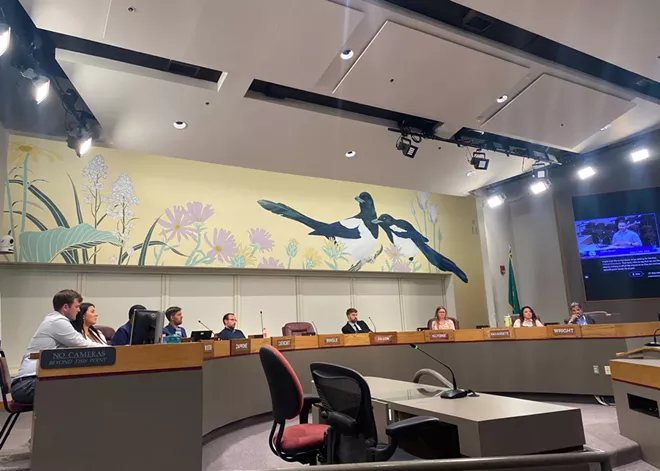Freshman Spokane City Council member Lili Navarrete didn't expect her proposed homeless anti-discrimination law to cause such an uproar.
When she introduced the ordinance last month, the goal was simple: Protect homeless people from discrimination when they apply for housing or jobs by adding "housing status" to the city's list of protected classes.
The proposed law — often referred to as the "Homeless Bill of Rights" — aims to give unhoused people the same protections that prevent landlords and employers from turning people away simply due to protected characteristics such as race or sexual orientation. It also includes language to enshrine unhoused peoples' right to move freely in public spaces, retain control of their personal belongings and be free from unreasonable searches.
Backlash from business interests has been fierce. After delaying a planned vote earlier this month, the City Council voted on Monday to indefinitely defer the bill "back to committee," citing community division and a need for more outreach.
The proposed law isn't dead, says City Council member Zack Zappone, who pushed for the indefinite deferral. It will come back for a vote at some point as part of a larger conversation about the city's homeless policies, Zappone says. There will be roundtables involving community leaders and maybe some larger town halls.
Finding consensus won't be easy. While homeless rights advocates have argued that the proposed law is important to protect peoples' dignity, business organizations like the Downtown Spokane Partnership and Spokane Business Association have lobbied heavily against it — arguing the ordinance uses vague language that would confuse businesses and exacerbate safety issues downtown.
In some ways, the proposal became a scapegoat for peoples' larger frustrations over Spokane homeless policy. The pushback was heated.
"People are just dissecting this and making this into things that are not true," Navarrete says. "We need to have a solution together."
Business owners argue that Navarrete's ordinance would make it impossible for businesses to trespass homeless people and prevent police from enforcing rules such as the city's unlawful camping and sit-lie laws.
Chris Batten, the vice chair of developer Larry Stone's recently formed Spokane Business Association, argued in a letter to Navarrete and other city officials that the law would result in "crime spiraling out of control."
Navarrete says the concern is unfounded.
In a detailed reply to a list of questions from Downtown Spokane Partnership CEO Emilie Cameron on Aug. 7, Navarrete said that "an individual's housing status does not equate to a license to violate other laws."
As an immigrant from Mexico, Navarrete notes that she, too, is a member of a protected class. But that obviously doesn't mean she's allowed to commit crimes.
Still, business owners continued to rally against the proposal. Several days before the originally scheduled vote, local developer Sheldon Jackson described it as a "warped, idiotic, entitlement for the 1%, drug addicted, criminals, living on Spokane streets" in a message to the private email group of politically connected, prominent business owners that he manages.
As the ordinance came up for a vote on Aug. 12, dozens of people packed City Hall, passionately arguing for and against it.
"People are being discriminated [against] because of their lack of an address in this community," said Anwar Peace, the chair of the city Human Rights Commission. "I hope we do something to honor our homeless neighbors and their lives."
After listening to more than an hour of testimony on Aug. 12, City Council member Kitty Klitzke proposed deferring the ordinance indefinitely, citing the community division and a need for more input.
Council member Michael Cathcart, one of the council's two-person conservative minority, pushed back. He alleged that Mayor Lisa Brown's administration had been quietly pressuring other City Council members to defer the ordinance because of concerns it would politically damage her proposed public safety sales tax, which is set to appear on the Nov. 5 ballot.
"This deferral is a bit disingenuous," Cathcart said. "It's misleading to the citizenry."
Rumors about a politically motivated deferral had been floating around for a while. On July 30, in response to an email from Cathcart asking for help formatting an amendment, the City Council's policy adviser recommended that Cathcart submit his amendment to Navarrete's bill quickly because "it is likely that the administration will ask CM Navarrete to defer her ordinance until after the November election."
(Cathcart stresses that the policy adviser was just doing his job and wasn't trying to create issues.)
Navarrete also alluded to election-related political pressure to defer the vote during an Aug. 1 Homeless Coalition meeting. The Inlander heard similar suspicions from other sources in the week leading up to the vote.
Erin Hut, the mayor's spokesperson, says she's not sure where the rumor started, but that it's totally false.
Brown did discuss a desire to defer the ordinance with council members, Hut says, but that was only because the mayor had concerns about implementation and lack of community consensus — not the upcoming sales tax vote.
Navarrete says that, while she did hear the rumor, the mayor never directly told her anything about deferring because of the election. Council member Paul Dillon says he also heard the rumor, but nothing came directly from the administration.
Following Cathcart's allegation of ulterior political motives, the City Council initially agreed to compromise with a two-week deferral. One week later, during an Aug. 19 briefing session, the Council voted at Zappone's suggestion to indefinitely defer the ordinance "back to committee," with Cathcart opposed. The members also voted to defer a proposal from Cathcart to expand the city's camping ban even more than voters did last year, arguing that both ordinances should be considered together as part of a larger conversation.
"I mean, the most important thing is for the process to be inclusive," Zappone says when directly asked if the mayor requested the council defer the ordinance because of political optics.
Zappone adds that he has argued from the beginning for a process that is holistic and "inclusive of lots of voices."
"That process takes awhile," Zappone says.
Klitzke says there were "so many different considerations," and stresses that the City Council is an independent body that doesn't take directions from the administration.
"Just a lot going on," Klitzke says. "There was so much division."
Hut says Brown isn't necessarily opposed to Navarrete's ordinance, but the mayor does have concerns about ensuring that the city could enforce it. She says there's a history of the City Council passing ordinances without fully identifying how follow-up would work.
"You have to understand the cost associated with it," Hut says. "We haven't really had that."
The ordinance doesn't come with any funding commitments. In her email to the Downtown Spokane Partnership, Navarrete said enforcement would fall on the city's Office of Civil Rights, Equity and Inclusion, which is already tasked with handling complaints related to other forms of discrimination. The City Council's homeless policy manager also prepared a detailed flowchart for how enforcement and complaints would be handled.
Navarrete has spent the past week meeting with opponents of the ordinance. She says she had a "really good conversation" with Gavin Cooley, the newly appointed CEO of the Spokane Business Association.
Despite the division, Dillon says he heard general agreement regarding the employment aspect of the bill and is workshopping a new version more narrowly focused on banning required address boxes on employment applications.
"We can start there and find some common ground," Dillon says. ♦

























